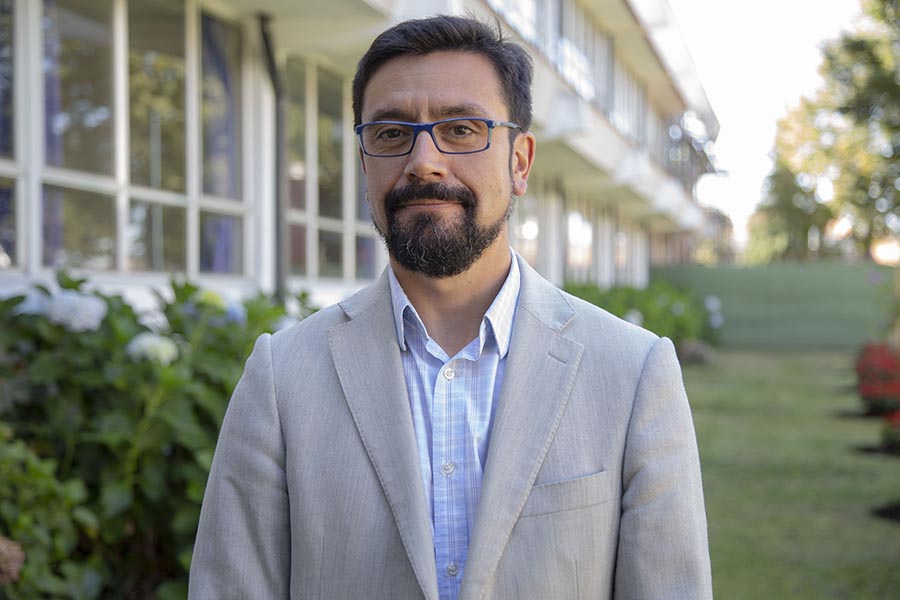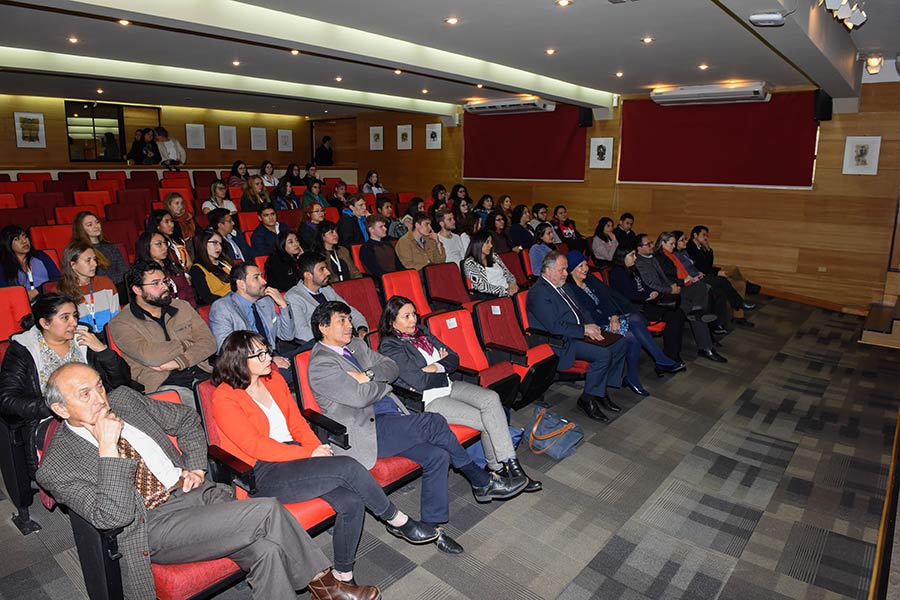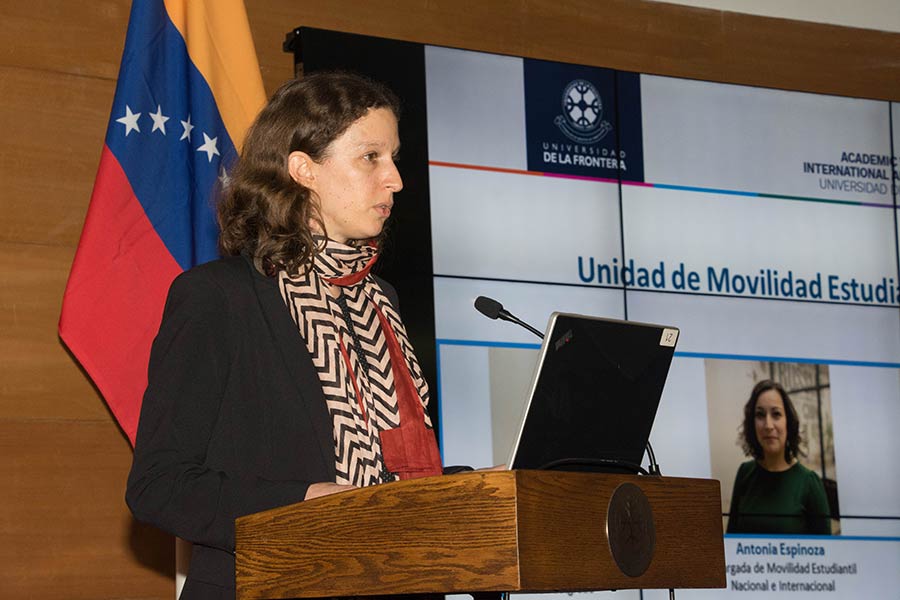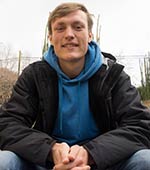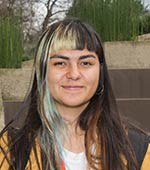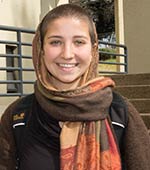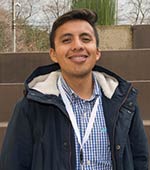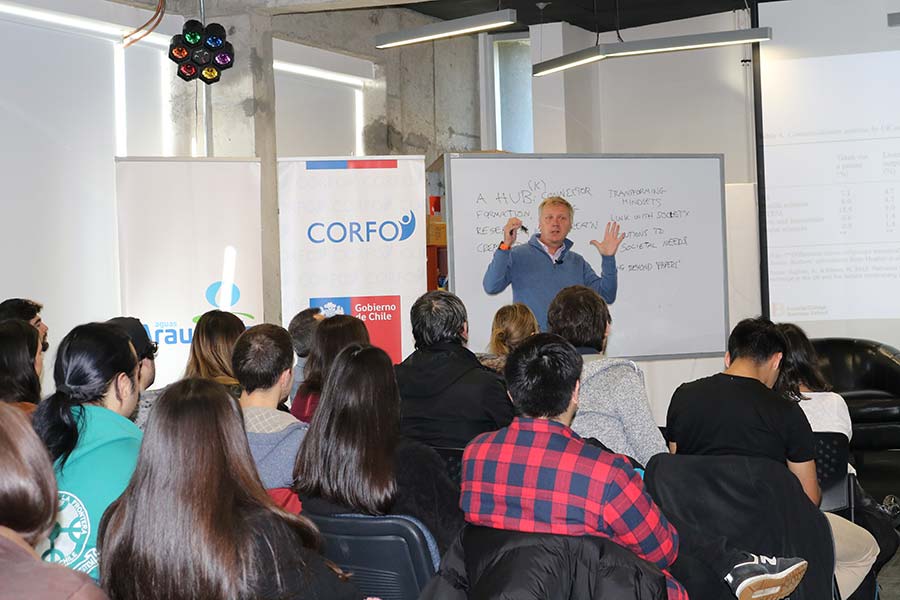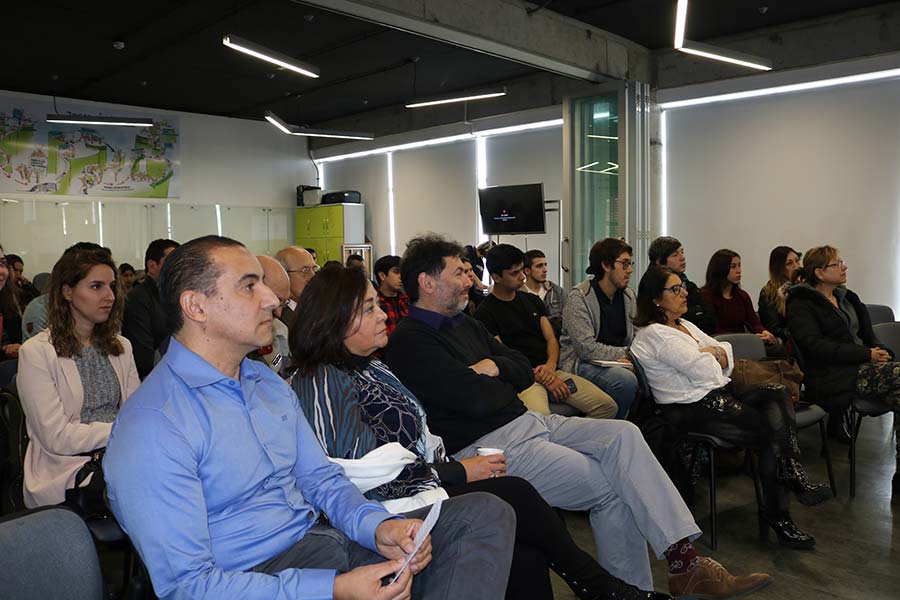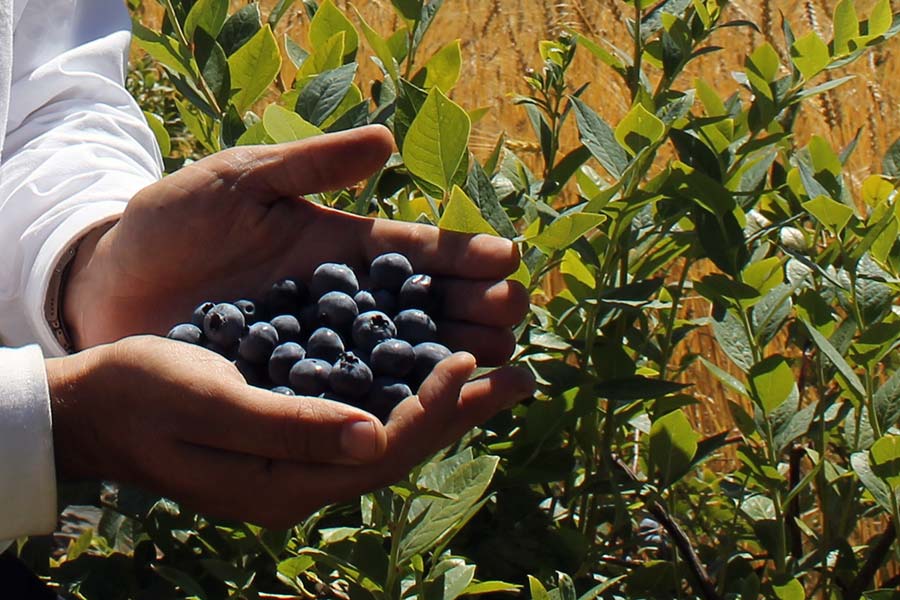|
Dr. Renato Hunter, the Vice-rector for Research and Graduate Studies of the UFRO visited five universities and technology parks in Israel, together with peers of six other Chilean universities. |
The technological ecosystems developed in Israel since its creation as a state in 1948 have turned this country into a great power in R&D&I. The state invests 4.5% of their GDP in research, the second highest amount worldwide. It also has 354 multinational companies, 23 business incubators, 106 accelerators and more than 250 Venture Capital funds, what turns the country into a leader in startups. With the aim of learning more about that, Dr. Renato Hunter, the Vice-rector for Research and Graduate Studies of the Universidad de La Frontera (UFRO), along with his peers from six other Chilean universities, went to Israel and made a tour, which included several technology parks, universities, institutes and research centers. The synergy between universities and businesses is one of the main strategies. It is a collaborative model that allows to strengthen the research focus regarding the fields of priority in the country. In this context, one of the establishments they visited was the Ben-Gurion University of the Negev in the south of Israel. Its particularity is its Advanced Technology Park that is managed by the university itself. “There is a building in that same park that was built by the university and three others built by multinational companies, which have set up their headquarters for development and research there. They are natural allies, there is an integration between university and company, they work together in a unified way,” Dr. Hunter explained. Another institution they visited was the Technion – Israel Institute of Technology, located in Haifa, in the north of Israel. There, they got to know a technology transfer model characterized by the strong focus on startup creation. The institute is less than 50 years old, has 13,500 thousand students, 60 innovation centers, 3 main research lines and an income of 289 million dollars only by licensing in one year. “They focus on encouraging the students to innovate since the beginning of their professional training. That means that, today, they already registered more than a thousand patents,” Dr. Hunter points out. The University of Haifa, which has a specific and autonomous unit for commercialization and licensing, where the process of intellectual protection and the negotiation to put the product on the market is done, was also on their schedule. “The researcher is not involved in the negotiation process,” the university authority explains. They also found a similar system at the Weizmann Institute of Science in Tel Aviv, whose technology transfer unit operates independently, with an annual budget of 400 million dollars (only for licensing). In Jerusalem, they visited the Hebrew University that already won 8 of the 12 Nobel Prizes the country has. One of the latest successful businesses created at this university is Mobileyes, a security device to prevent car accidents, developed by a professor of the university. “It is interesting how they concentrate on patenting, without focusing on the finished product, but on the different stages of invention, for example, they can enter the market with a formula of a drug, but not necessarily with the finished product,” Dr. Hunter explains. PRODUCTIVITY AND COOPERATION Israel has only nine universities. All of them are public. The state invests the necessary funds so the universities can operate, but the growth of them is financed through competitive projects associated with the priority lines and indicators of productivity. The Israel Research Agency has a group of researchers who visit the different universities and technology parks in order to identify common aspects of development, thus making thematic calls for the development of new technologies and projects. “They focus on specific fields, but above all, they establish a deep cooperative ecosystem. About 300 thousand people are working on knowledge and development. It is a small nucleus, where the main recipe is cooperation and the creation of networks. Besides, they have a culture of failure as a learning process, it is not stigmatized,” the vice-rector comments. After the trip and in order to continue learning about Israel’s R&D&I model, the participants of the Chilean universities are arranging the visit of an expert of the Hebrew University of Jerusalem in Chile, so he can share his experience in technology transfer with the Chilean universities.
Written by: Karimme Riadi
Vice-rectorate for Research and Graduate Affairs |
|
A total of 60 international students from Germany, Argentina, Bolivia, Brazil, Colombia, Spain, the USA, the Netherlands, Mexico and Poland join the UFRO, together with three national students of other Chilean universities. |
Each semester, students from different parts of the world decide to join the Universidad de La Frontera (UFRO), using the different agreements and student mobility programs for undergraduate studies. Besides, at their universities, they have a good impression of the UFRO and got positive recommendations from those who have already spent a semester or whole year studying at the UFRO. This semester, a total of 60 international students from Germany, Argentina, Bolivia, Brazil, Colombia, Spain, the USA, the Netherlands, Mexico and Poland join the UFRO, together with three national students of other Chilean universities who opted for national mobility through the agreement of Universities of the State of Chile (CUECH). For the Rector of the UFRO, Dr. Eduardo Hebel, student mobility is an essential pillar within the framework of internationalization. “Not only because we have the desire that our students can learn about different realities, but also because by receiving international students at our university, we can enrich a process of personal, professional and cultural growth,” he pointed out. The university authority encourages the students to turn this experience into a time of great learnings. “Make the most of your stays! At the UFRO, you will be able to interact with a community of about 10 thousand undergraduate students, a thousand graduate students and more than 400 researchers, in other words, a great variety of human capital that is willing to help you,” he added. The director of the International Affairs Office gave a warm welcome to the foreign students from about 30 universities and technical institutes from America and Europe. “We hope that everyone will be able to fulfill their expectations and goals. From our point of view, internationalization is more than a challenge in itself, but also a way to achieve greater quality and to fulfill our institutional objectives, without losing the value of interculturality, of the aspects that characterize us," she said. Antonia Espinoza, who is in charge of the National and International Student Mobility Unit of the Universidad de La Frontera, affirmed: “We are very happy that we can welcome students from different universities each semester, thanks to our cooperation agreements.”
Written by: UFRO Communications Office
|
|
The project contemplates the creation of an international research consortium. The UFRO will be in charge of the southern node in Chile. |
“Territories of response” is the name of the Horizon 2020 project that has just been awarded to the research group on culture and territory at the Social Science Nucleus of the Universidad de La Frontera (UFRO) and the Center of International Research of the Patagonia (CIEPatagonia). The initiative will bring theoretical and empirical knowledge about alternative models of development that challenge the traditional schemes and that tend to create sustainable and resilient environments. It is an emerging field of research in the world that focuses on the value of territorial knowledge and on how it provides different points of view regarding social organization, responding to the dominant hegemonic model. “The spaces of response are organized in a non-traditional manner, establishing communities that see the world in a different way, and implementing, for example, different pedagogical practices or relationships with nature from a new perspective,” Dr. Hugo Zunino, the director of the UFRO node of the consortium explained. The project includes the formation of an international research consortium, comprised of the University of Leeds (UK), University of Sheffield (UK), Autonomous University of Madrid (Universidad Autónoma de Madrid) in Spain, Polytechnic University of Milan (Politecnico di Milano) in Italy, Free University of Berlin (Freie Universität Berlin) in Germany, University of Buenos Aires (Universidad de Buenos Aires) in Argentina, University of San Andrés (Universidad de San Andrés) in Bolivia, Pontifical Xavierian University (Pontificia Universidad Javeriana) in Colombia, Latin American Faculty for Social Sciences (Ecuador), University of Chile and the Universidad de La Frontera. VERTICAL KNOWLEDGE “The first thing we are going to do is to find out where these spaces of response are and to get to know their people. This study is going to be ethnographic. We will be involved in the daily life of these groups,” the researcher clarified. Afterwards, the process of documentation and dissemination will begin through social and artistic expressions. The discussion will also be taken to the academy, responding to the traditional way of knowledge creation. “We are revealing, emphasizing and enhancing local knowledge, the experiences of daily life, the different ways to think about urban and rural development, to think about our relationship with nature and other people. We are addressing the Cartesian and Kantian model, we are discussing with this vertical knowledge, overcoming the invisibilization of the human being in modern science,” Dr. Zunino added. The researchers are currently in the phase of planning the activities of this project, which will have a duration of two years. The aspiration is to establish a research field within the universities, and particularly at the Universidad de La Frontera, that focuses on the spaces of response, revealing the value of territorial knowledge and its contribution to sustainability and resilience.
Written by: Karimme Riadi
Vice-rectorate for Research and Graduate Studies |
|
The attendance and participation marked the seminar at the UFRO, which left the message that entrepreneurial capacities arise when individuals and organizations decide to confront the risks and to make the leap. |
With the idea to respond to the questions of the local and regional audience, university members and the ones interested in making the leap from investigation to science, the Institute IDEA-UFRO of the Universidad de La Frontera (UFRO) invited a world-class expert to share his knowledge. Erkko Autio is renowned as one of the 50 professors with most influence in global management. He was the main speaker at the seminar “Science for Innovation”, which the UFRO carried out. To learn about the environment of innovation with experiences that transform and stimulate inspiration, knowledge and actions – these are some of the objectives with which the Institute IDEA-UFRO has been disseminating its activities in 2019, besides of the big projects and initiatives for the promotion of an entrepreneurial spirit and collaborative learning. During the seminar, the Chair in Technology Transfer and Entrepreneurship at Imperial College London Business School – one of the institutions with most influence in London regarding the creation of hubs for innovation and entrepreneurship, which are capable of converting the cities they are located in into leading innovation centers – addressed how it is possible to generate a significant impact of social relevance through research. In this context, Autio emphasized the privileged position of universities and technical centers (such as recruiters, knowledge-creators, and also creators of spaces for cooperation) and addressed issues of the studies focused on digitalization and the impact on the ecosystems of innovation, in the internationalization of companies and the creation of new business models. “Digitalization is basically changing everything. It is transforming how value is created in society, and how therefore societies should organize for value creation. And it is transforming the process of entrepreneurial opportunity discovery and pursue,” he said. In a promotional video that was disseminated by IDEA-UFRO for the promotion of the event, the professor explains how the Imperial College London Business School has been dealing with the big global challenges, aspects that are essential in the development of innovation and entrepreneurship, and explained: “Imperial picks mayor global challenges and then tries to resolve them. Only then does it bring in academic disciplines. There is a big focus on climate change, global health, global energy systems, digitalization, and so on. This is very different from many other places, where the academic discipline is the starting point.”
 Written by: UFRO Communications Office Written by: UFRO Communications OfficeThis email address is being protected from spambots. You need JavaScript enabled to view it. |
|
The congress will include the participation of invited speakers from the United States, Switzerland, Bolivia, Argentina, Spain, Uruguay and Chile. |
On October 17 and 18, 2019, the Universidad de La Frontera (UFRO) will host the first Congress on Agroecology in Chile at its Pucon Campus. It is organized by the UFRO and the Chilean Division of the Latin American Scientific Society of Agroecology (SOCLA-Chile). At the UFRO, the Laboratory of Agroecology and Alimentary Sustainability of the UFRO Faculty of Agricultural and Forestry Science is the main organizing unit for this event that seeks to open a space to meet and share knowledge on agroecology from different perspectives and fields of action: science/academics; specialists/professionals; agriculture/farmers; and politics/activists. The participants and invited speakers from the United States, Switzerland, Bolivia, Argentina, Spain, Uruguay and Chile will come together under the motto “Agroecology: transcending practices towards food sustainability” and there will also be an exposition of posters, oral presentations, symposia and workshops on different issues in the field: agroecological practices and management; rural and food policies and development; feminism and social movements; agricultural/food systems; society and environment; and agroecosystems and ecosystem services. Dr. Rene Montalba, the chairman of the Organizing Committee, pointed out that this congress is meant to be slightly different compared to the classic disciplinary scientific meetings: “The very nature of Agroecology are disciplines, such as: transdisciplinary critical science; sustainable technical and productive proposals; and agrarian, food social movements. This converts it into a space of scientific confluence, where the most varied disciplines, fields and kinds of knowledge meet; agricultural producers of different levels and professionals who are linked to food production, distribution and/or consumption; decision makers of different organizations, as well as politicians and activists linked to social movements or agrarian and food processes.” OPEN COURSES As part of the congress, the UFRO is going to offer two open courses open to the general public (vacancies limited). The first one is about “Agroecology and Sustainable Food” and will take place on October 15 and 16 at the UFRO Faculty of Agricultural and Forestry Science in Temuco, Chile. The second one is about “Design, Implementation and Management of Agroecological Lighthouses for the dissemination of Sustainable Agricultural Systems” and will take place on October 16 at the Center for Education and Technology – CET Bío Bío in Yumbel, Chile. After these courses, transportation to Pucon Campus of the UFRO will be available for the participants of the congress. For more information or consultations, please contact This email address is being protected from spambots. You need JavaScript enabled to view it. or enter agroecologia.ufro.cl.  Written by: UFRO Communications Office Written by: UFRO Communications OfficeThis email address is being protected from spambots. You need JavaScript enabled to view it. |





